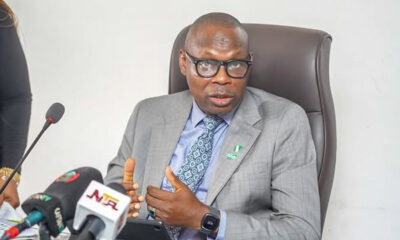Education
No going back on strike if govt fails to honour agreements –ASUU

Academic Staff Union of Universities (ASUU), Federal University Oye-Ekiti (FUOYE) branch, yesterday, urged the Federal Government to implement all the components of the December 2020 memorandum of action (MoA), warning that failure to do so is a direct call for the resumption of suspended strike in the nation’s universities.
The decision was taken at ASUU-FUOYE branch congress and in reaction to the lingering failure of the Federal Government to honour the agreements reached with the union.
Principal officers present at the congress include; Olu Olu Olufayo, zonal coordinator, ASUU, Akure Zone; Yinka Awopetu, chairperson, ASUU-FUTA; Kayode Arogundade, chairperson, ASUU-EKSU and other leaders in ASUU, Akure Zone.
The statement, which was signed by the Financial Secretary, ASUU-FUOYE, Abayomi Fagbuagun, on behalf of the chairperson, Gabriel Omonijo, said the only thing that could compel the government to honour its agreements with the union is a strike.
“The government has not been sincere regarding the performance of Integrate Personnel Payroll Information System as a payment platform in that some lecturers of the Federal University Oye-Ekiti are owed salary and promotion arrears by the government.
According to him, the congress frowned at government’s insincerity in the implementation of the December 2020 MoA, most especially, the renegotiation of academic staff salaries and emoluments.
READ ALSO:
- OAU student dies after falling into ‘soakaway’
- Police confirm killing of 7 by cultists in Imo
- Terrorists kill DPO, soldier, one other; abduct housewife in Katsina
- Land grabbers impersonate judgment creditors, demolish property, victims tackle Lagos task force
“The current salary of academic staff is nothing to write home about when compared with what their counterparts all over the world are earning at the end of every month. The branch maintained that the only thing that could stop the resumption of strike is for the government to honour, most especially, the renegotiation components of the agreements as well as University Transparency and Accountability Solution.
“The branch has resolved that since the renegotiation has been completed, the only thing that could avert the impending strike is for the government to expedite action on the immediate implementation of the agreements reached with the union.
“ASUU-FUOYE, hereby, calls on well-meaning Nigerians to prevail on the Federal Government to honour the agreements reached with ASUU in order to prevent the imminent collapse of the educational system which is as a result of incessant strikes engendered by government’s laxity in honouring agreements.
“We are ready to speak the language the government understands to get it adhere to the agreements signed with the union. The government is hereby admonished to act fast before it is too late.”
Meanwhile, Ambrose Alli University (AAU), Ekpoma chapter, yesterday, called on Nigerians to prevail on the Federal Government to sign the renegotiated agreement, meet the demands of the union in the interest of the development of public universities and industrial harmony or be prepared for another industrial action.
The appeal was contained in a statement by the Chairperson and the Secretary of ASUU, AAU, Ekpoma, Cyril Ozeigbe Onogbosele, and William Odion, respectively, in Benin.
The duo said the union insisted the offensive and unacceptable negative disposition of government towards public universities in the country is unacceptable and should no longer be tolerated, henceforth
They urged the government to do the needful and stop the over-recited rhetorics of unfulfilled promises and commitment to education in the country.
“The only pragmatic solution to avert the impending strike is to sign and implement the renegotiated agreements.
“Rising from a mobilisation and sensitisation congress at Ekpoma, the university lecturers expressed strong resolve and readiness to join their colleagues in other public universities in the strike to compel the government to sign the renegotiated 2009 FGN/ASUU agreements and meet other demands of the union contained in the various relevant memorandum of understandings (MoUs).
Sun
Education
Ogun Gov Rewards Nigeria’s Best Primary School Teacher with Car, Bungalow

Ogun Gov Rewards Nigeria’s Best Primary School Teacher with Car, Bungalow

Ogun Gov Rewards Nigeria’s Best Primary School Teacher Solanke Francis Taiwo with Car and Bungalow
The Ogun State Governor, Dapo Abiodun, has honoured Mr Solanke Francis Taiwo, a primary school teacher at Ansa‑Ur‑Deen Main School I, Kemta Lawa, Abeokuta, with a brand new car and a two‑bedroom bungalow in recognition of his achievement as Nigeria’s Overall Best Primary School Teacher for the 2025/2026 academic year.
The presentation took place at the Governor’s Office in Oke‑Mosan, Abeokuta, with the Commissioner for Education, Science and Technology, Prof Abayomi Arigbagbu, and the ministry’s Permanent Secretary, Mr Oloko, in attendance. The gifts were part of a broader effort to motivate teachers, reward professional excellence, and highlight the state’s education reforms.
Speaking at the event, Prof Arigbagbu said the award demonstrates the effectiveness of the Ogun State Education Revitalisation Agenda, which is built on six pillars including curriculum enhancement, school administration, innovation, infrastructure, funding, and teachers’ welfare. “When you do things consistently and efficiently, you record results. This same teacher won the Ogun State Best Teacher Award in October before clinching the national award in Abuja. This confirms that our education sector has been truly revitalised,” he said.
READ ALSO:
- Police Bust Gang Armoury, Arrest Two Suspects in Delta
- Peter Obi Launches ‘Village Boys Movement’ to Rival Tinubu’s City Boys Ahead of 2027
- Woman Dies in Bandits’ Camp After Family Pays ₦25 Million Ransom

Ogun Gov Rewards Nigeria’s Best Primary School Teacher Solanke Francis Taiwo with Car and Bungalow
He highlighted the state’s successes in national competitions, including the JETS contests, where Ogun students won 18 out of 24 awards in one year, with a single student claiming nine prizes. The commissioner also noted that Ogun’s Technical and Vocational Education and Training (TVET) model and education digitisation initiatives have attracted attention from other states and received commendation from the Federal Government and the National Board for Technical Education.
Governor Abiodun reaffirmed his commitment to teacher development, pledging continuous support through workshops, seminars, digital learning platforms, and AI-powered instructional tools. He said the gifts of a car and bungalow are intended to inspire other educators to strive for excellence and innovation in their teaching.
In his remarks, Mr Solanke expressed gratitude to the governor and the education ministry for fostering an enabling environment for teaching and learning. He vowed to continue improving student learning outcomes and collaborating with colleagues to ensure that Ogun State remains a leader in education excellence.
“I feel fulfilled and honoured. I will continue to give my best and encourage fellow teachers to remain dedicated to nurturing the potential of every student,” he said.
The recognition of Mr Solanke reflects Ogun State’s strategic investment in education, commitment to teacher welfare, and the effectiveness of policies that have positioned the state as a model for academic excellence in Nigeria.
Ogun Gov Rewards Nigeria’s Best Primary School Teacher with Car, Bungalow
Education
Over 1.5 Million Candidates Registered as JAMB UTME Pin Vending Nears Deadline

Over 1.5 Million Candidates Registered as JAMB UTME Pin Vending Nears Deadline
The Joint Admissions and Matriculation Board (JAMB) has confirmed that more than 1.5 million candidates have registered for the 2026 Unified Tertiary Matriculation Examination (UTME), as the deadline for e‑PIN vending and registration rapidly approaches.
In a statement released in Abuja by the board’s Public Communication Advisor, Dr. Fabian Benjamin, the board said the sale of e‑PINs — required for candidates to proceed with registration at accredited centers — will close at midnight on Thursday, February 26, 2026, while actual registration at centres will end on Saturday, February 28, 2026.
According to JAMB, its daily registration capacity stands at 100,000 candidates, but most centres are currently operating at roughly 30 per cent capacity, indicating that a significant number of eligible candidates have yet to register. The board emphasised that there will be no extension of the registration window, explaining that the schedule aligns with the national examination calendar and is coordinated to allow other examination bodies to conduct their exercises without conflict.
READ ALSO:
- FG Seals Plateau Mine After 37 Killed in Toxic Gas Tragedy
- Troops Kill Five Kidnappers, Rescue Abducted Woman in Plateau
- Sowore Condemns Electoral Act 2026 as Threat to Nigeria’s Democracy
JAMB urged candidates to secure their e‑PINs early and complete registration at accredited CBT centres without delay. The board warned that last-minute registration could result in avoidable challenges and reiterated that it will not entertain appeals for deadline extensions.
The 2026 UTME is scheduled to hold from April 16 to April 25 and will determine admission into universities, polytechnics, and colleges of education across Nigeria. JAMB also assured candidates that all testing centres would have adequate security, technical support, and invigilation to ensure a smooth and credible examination process.
Education experts and stakeholders have encouraged candidates to register promptly and take advantage of preparatory resources offered online and at local centres. State education authorities have also organised orientation programmes to guide students through registration, examination, and post-UTME procedures.
JAMB continues to provide updates and guidance through its official portal and social media channels, ensuring that candidates have access to information about registration, examination procedures, and exam day requirements.
Over 1.5 Million Candidates Registered as JAMB UTME Pin Vending Nears Deadline
Education
BREAKING: Academic Activities Halted as ASUU Resumes Strike

BREAKING: Academic Activities Halted as ASUU Resumes Strike
The Academic Staff Union of Universities (ASUU), Taraba State University (TSU) branch, has resumed an indefinite strike, citing the failure of the Taraba State Government to honour agreements reached earlier with the union.
The industrial action comes weeks after ASUU suspended its earlier strike following negotiations held on January 17, 2025, a move the union said was done in good faith to allow the government time to meet its commitments. According to ASUU, those promises were not fulfilled, forcing lecturers to withdraw their services again.
In a statement issued in Jalingo, the ASUU TSU branch chairman, Joshua Garba Mbave, said the government failed to take practical and verifiable steps toward resolving the lingering issues affecting staff welfare.
READ ALSO:
- Ramadan Health Tips: Six Ways to Stay Hydrated While Fasting
- Tinubu Urges Senate to Confirm Yusuf for NAHCON, Marafa for INEC
- Galatasaray Stun Juventus 5–2 in UEFA Champions League
The union said its congress meeting held on February 18, 2026, reviewed developments since the suspension of the strike and unanimously agreed to resume the total, comprehensive, and indefinite strike.
ASUU listed several unresolved demands, including unpaid salary arrears, non-payment of Earned Academic Allowances, the absence of a functional pension scheme for university workers, and the failure to implement the 2025 ASUU–Federal Government agreement applicable to state-owned universities.
Dr. Mbave warned that the continued neglect of these issues has crippled staff morale, worsened economic hardship for lecturers, and disrupted academic stability at Taraba State University. He stressed that sustained dialogue with the Taraba State Government had produced no concrete outcome.
As a result of the renewed strike, academic activities at Taraba State University have been suspended indefinitely, with students advised to remain at home until further notice.
BREAKING: Academic Activities Halted as ASUU Resumes Strike
-

 International2 days ago
International2 days agoCanada Opens New Express Entry Draw for Nigerian Workers, Others
-

 Politics22 hours ago
Politics22 hours agoPeter Obi Launches ‘Village Boys Movement’ to Rival Tinubu’s City Boys Ahead of 2027
-

 News3 days ago
News3 days agoKorope Drivers Shut Down Lekki–Epe Expressway Over Lagos Ban (Video)
-

 News1 day ago
News1 day agoPolice to Arrest TikToker Mirabel After She Recants False Rape Claim
-

 International1 day ago
International1 day agoEpstein, Ex-Israeli PM Named in Alleged Profiteering From Boko Haram Crisis
-

 metro2 days ago
metro2 days agoOsun Awards 55.6km Iwo–Osogbo–Ibadan Road Project to Three Contractors
-

 Politics2 days ago
Politics2 days agoUpdated: Rivers Senator Mpigi Barinada dies at 64
-

 metro2 days ago
metro2 days agoOndo Monarch Killed as Bandits Strike Akure North















